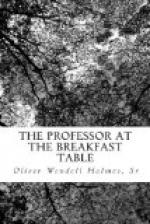I found these stanzas in the young girl’s book among many others. I give them as characterizing the tone of her sadder moments.
Under the violets.
Her hands are cold;
her face is white;
No more her pulses come
and go;
Her eyes are shut to
life and light;
Fold the white vesture,
snow on snow,
And lay her where the
violets blow.
But not beneath a graven
stone,
To plead for tears with
alien eyes;
A slender cross of wood
alone
Shall say, that here
a maiden lies
In peace beneath the
peaceful skies.
And gray old trees of
hugest limb
Shall wheel their circling
shadows round
To make the scorching
sunlight dim
That drinks the greenness
from the ground,
And drop their dead
leaves on her mound.
When o’er their
boughs the squirrels run,
And through their leaves
the robins call,
And, ripening in the
autumn sun,
The acorns and the chestnuts
fall,
Doubt not that she will
heed them all.
For her the morning
choir shall sing
Its matins from the
branches high,
And every minstrel voice
of spring,
That trills beneath
the April sky,
Shall greet her with
its earliest cry.
When, turning round
their dial-track,
Eastward the lengthening
shadows pass,
Her little mourners,
clad in black,
The crickets, sliding
through the grass,
Shall pipe for her an
evening mass.
At last the rootlets
of the trees
Shall find the prison
where she lies,
And bear the buried
dust they seize
In leaves and blossoms
to the skies.
So may the soul that
warmed it rise!
If any, born of kindlier
blood,
Should ask, What maiden
lies below?
Say only this:
A tender bud,
That tried to blossom
in the snow,
Lies withered where
the violets blow.
XI
You will know, perhaps, in the course of half an hour’s reading, what has been haunting my hours of sleep and waking for months. I cannot tell, of course, whether you are a nervous person or not. If, however, you are such a person,—if it is late at night,—if all the rest of the household have gone off to bed,—if the wind is shaking your windows as if a human hand were rattling the sashes,—if your candle or lamp is low and will soon burn out,—let me advise you to take up some good quiet sleepy volume, or attack the “Critical Notices” of the last Quarterly and leave this to be read by daylight, with cheerful voices round, and people near by who would hear you, if you slid from your chair and came down in a lump on the floor.




